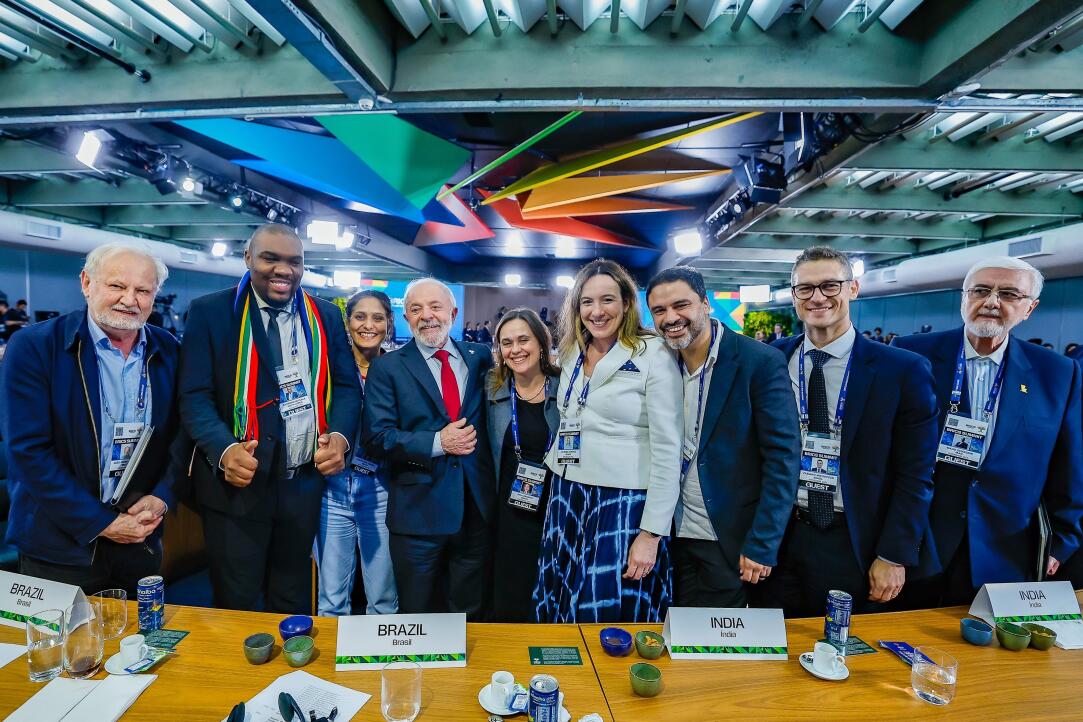HSE Takes Part in BRICS Summit

On July 6–7, 2025, the 17th BRICS Summit took place in Rio de Janeiro. For the first time in the organisation’s history, representatives of civil society from BRICS countries participated. HSE Vice Rector, Head of the BRICS Expert Council–Russia, and Co-Chair of the Russian Chapter the BRICS Civil Forum Victoria Panova attended the meeting of the bloc’s national leaders.
In the run-up to the summit, a special session of the Civil BRICS Council was held in Rio de Janeiro on July 4–5. Representatives of civil society from the member countries reached consensus on a set of recommendations, which were formally presented to the heads of state on July 6 during the summit.
The presentation of these recommendations at the highest level marked the culmination of months of work within the BRICS civil track, which brought together over 120 public organisations from BRICS member and partner countries. Since the beginning of the year, dozens of online consultations had been held to develop a coordinated position. In April and May, HSE University hosted roundtable discussions involving the Russian chapter of the Civil BRICS Council, during which thematic working groups drafted position papers. A key milestone in the preparation process was the first on-site session of the Civil BRICS Council, held on July 4–5 in Rio de Janeiro. The special session brought together delegations of civil society activists, experts, and academic representatives from BRICS countries and their partners.
The final document outlined proposals across seven key areas of the Global South’s agenda. The recommendations focus on enhancing cooperation in the social, economic, technological and cultural spheres, expanding academic exchange, strengthening digital sovereignty, promoting sustainable development, and formalising civil society participation within the BRICS framework. Collectively, they reflect a desire for a fairer and more equitable world order in which the interests of developing nations and the voice of civil society play an increasingly prominent role.

Victoria Panova
‘Civil BRICS is not just a movement. It is not merely a club. It is a family. For the first time, we can say that BRICS represents a qualitatively new form of international alliance. Civil BRICS is an important complement to this, as the process clearly demonstrates how close we are and how much we can accomplish together for the benefit of our peoples,’ noted Victoria Panova. She added that the formalisation of the Civil BRICS Council was made possible through the combined efforts of all member states, with crucial institutional steps taken during Russia’s presidency in 2024.
The establishment of the Civil BRICS Council was enshrined in the Kazan Declaration in July 2024. It became a natural continuation of the BRICS Civil Forums held annually since 2015. Over the past decade, this track of public diplomacy has evolved into a permanent platform for dialogue between civil society organisations and BRICS governments.
For several years, HSE University has been providing expert support for civil society engagement within the BRICS framework. The university actively contributes to shaping Russia’s people-to-people agenda and helps to promote the values of equitable dialogue, sustainable development, and inclusive community involvement in international cooperation processes.
The next on-site meeting of the Civil BRICS Council is scheduled for October 2025 in the city of Salvador, Brazil. It will continue the discussion of implementation mechanisms for the proposed initiatives and explore ways to broaden the participation of Global South countries in the bloc’s agenda.
See also:
Scientists Develop Effective Microlasers as Small as a Speck of Dust
Researchers at HSE University–St Petersburg have discovered a way to create effective microlasers with diameters as small as 5 to 8 micrometres. They operate at room temperature, require no cooling, and can be integrated into microchips. The scientists relied on the whispering gallery effect to trap light and used buffer layers to reduce energy leakage and stress. This approach holds promise for integrating lasers into microchips, sensors, and quantum technologies. The study has been published in Technical Physics Letters.
HSE University–St Petersburg and Universiti Teknologi Malaysia Release First Book of Mirror Laboratory
Malaysia hosted the AHIBS 'Weaving Horizons for Sustainable Impact' international conference, which featured the presentation of the first Russian–Malaysian book of research articles.
HSE GSB and Alfa-Bank Host Summer School for Chinese Students
The international summer school Digital Product Management, a joint educational project by the HSE Graduate School of Business (HSE GSB) and Alfa-Bank, brought together over 30 students from leading Chinese universities.
HSE University Students and Postgraduates Take Part in Peking University International Summer School
In July 2025, Peking University hosted its annual Quantum Molecular Dynamics Summer School, which has moved onto an international stage. Its first foreign guests were students and postgraduates from the HSE Tikhonov Moscow Institute of Electronics and Mathematics (MIEM). They took part in an extensive academic programme and had the opportunity to visit a laboratory that works with optoelectronic materials and energy devices.
HSE University to Host BRICS International School: New Generation
Registration for the BRICS International School: New Generation, one of the leading international educational projects aimed at prospective leaders interested in the agenda of global development and cooperation within the framework of BRICS, has opened.
HSE University Strengthens Ties with Peking University
On July 21, 2025, representatives from Peking University led by Zhang Jin, Vice President of Peking University and Chancellor of Shenzhen Graduate School, paid a visit to HSE University. The delegation included forty students, teachers, and administrators. During their visit, leaders from both universities discussed potential areas for future collaboration, and representatives from three HSE University departments held meetings with Chinese students.
HSE University Brings Together Researchers at International AI Summer Institute in Shanghai
In early July 2025, the International Summer Institute on Artificial Intelligence in Education took place in Shanghai. It was organised by the HSE Institute of Education in cooperation with East China Normal University (ECNU). More than 50 early-career researchers and keynote speakers from nine countries—ranging from Russia and China to Canada and Singapore—gathered to share the latest findings from their work and to forge new international partnerships.
'We Are Now Nearing Practical Application of a Stimulus-Free Brain-Mapping System'
Neural interfaces developed by scientists at HSE University in collaboration with clinicians make it possible to communicate with the brain and decode its signals. The use of such interfaces opens up opportunities to stimulate brain activity, restore and normalise muscle control in patients who have suffered a stroke, heart attack, or other neurological disorders, and support the rehabilitation of individuals with traumatic brain injuries or limb loss. Alexey Ossadtchi, Director of the Centre for Bioelectric Interfaces at the HSE Institute for Cognitive Neuroscience, discusses the centre and its work.
HSE University Presents Smart Orthosis at Hope for Technology Forum
On July 10–11, 2025, Moscow hosted the 10th Hope for Technology National Forum of the Rehabilitation Industry and Universal Design. The event was aimed at discussing innovative achievements in the rehabilitation industry. The MIEM Student Design Bureau and the HSE Institute for Cognitive Neuroscience presented a smart orthosis, which was developed at the request of orthopedists.
Experts Assess How BRICS Countries’ Education Systems Are Evolving
The BRICS Expert Council–Russia, based at HSE University and operating in collaboration with the HSE Institute of Education, has released an analytical report titled ‘The Transformation of General Education in BRICS Countries.’ The study explores how BRICS nations are addressing shared challenges, including equitable access to schooling, digital integration, support for inclusion, linguistic diversity, and intercultural dialogue.


